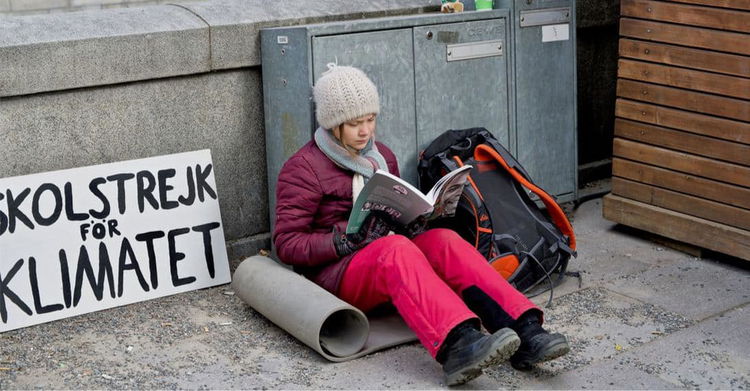Government leaders in Glasgow are still behind the climate curve but young activists might just drag the world ahead of it.

Whilst the world’s political elite is gathered in Glasgow for the United Nations climate conference, the future of our planet is hanging in the balance.
The recent UN emissions-gap report found that current government pledges are not even close to keeping the Earth within the 1.5C global heating threshold. To stay under the limit, the plans would need to be seven times as ambitious.
Roughly 50 countries and the European Union have already agreed to reach net-zero greenhouse-gas emissions by 2050. The summit is our last opportunity to achieve targets that would avert irreversible environmental catastrophe.
Sadly, however, the COP26 pledges have been underwhelming. At the beginning of the week, the Indian prime minister, Narendra Modi, declared that his country would aim to reach net zero … by 2070. Being the world’s third largest emitter of carbon dioxide after China and the United States, with a population of more than 1.3 billion people, India’s pledge left critics nonplussed.
Will world leaders step up their game—and what might convince them to do so?
Emergency appeal
Last week, an open letter from young climate campaigners, led by Greta Thunberg, went viral with more than one million signatures. With their emergency appeal, the youth activists were calling out politicians on their empty promises and glaring double standards at COP26.
Yesterday, the famous ‘Fridays for Future’ movement took over the streets of Glasgow. Back in 2018, the movement began with Thunberg sitting in front of the Swedish parliament every school day, urging politicians to take action to tackle the crisis.
Considering the apathy around climate change, ‘Fridays for Future’ has the potential to raise the stakes of the talks, tilting the scales in favour of the young climateers. Collective action is a powerful tool—perhaps the most powerful one there is.
By early yesterday afternoon it was estimated that around 25,000 people were taking part in the protest, making it the largest demonstration so far outside the summit. As the first week of the conference came to an end, millions joined around 200 demonstrations across the globe.
Great impact
Participation in protest has a great impact on young people’s political attitudes. A study in Germany recently discovered that ‘Fridays for Future’ had significantly changed perceived political responsiveness and satisfaction with democracy among youth.
While addressing crowds in Hamburg at an earlier protest, Thunberg aired one of her lines that later became famous: ‘We are striking because we have done our homework, and they have not.’ The Swedish activist has succeeded in mobilising young people across the globe, encouraging them to take matters into their own hands.
As we have seen with the recent German federal elections, young people can play a pivotal role in tilting public opinion ahead of polling day, giving the Greens their best national result in history. Following the success of ‘Fridays for Future’, Germany is now considering lowering the voting age to 16.
According to a poll conducted by the environmental association NABU ahead of the elections, however, 59 per cent of voters over 65 said they would not be considering younger voters’ climate-protection interests when casting their ballots. It’s no wonder young people are no longer willing to leave it to older generations to gamble with the future of our planet.
Not on track
António Guterres, the UN secretary-general, addressed the global public at COP26, highlighting that there is no time to waste: ‘Recent climate action announcements might give the impression that we are on track to turn things around. This is an illusion. Our addiction to fossil fuels is pushing humanity to the brink.’
Guterres’ statement resonated with the German public. The chancellor, Angela Merkel, has faced criticism over the country’s fossil-fuel addiction. Her party, the Christian Democrats (CDU), were called out by Greenpeace, which labelled the association with the German car industry an Achilles heel for the CDU.
Indeed, the German transport sector is the only industry that has failed to reduce its greenhouse-gas emissions since 1990. This makes it crucial to look into renewable alternatives, such as biofuels, which could facilitate the turn away from fossil fuels.
An example comes from south-east Asia: in Malaysia, a legally binding Malaysian Sustainable Palm Oil (MSPO) certification has successfully lowered the country’s deforestation for four years in a row. Investigating plausible alternatives to fossil fuels should be a part of any climate strategy. Along with industry-led net-zero commitments, certifications such as the MSPO could provide alternative ways to tackle over-reliance on fossil fuels.
Now or never
Recently, the United Nations Environment Programme production-gap report revealed how global fossil-fuel production must start declining immediately, and steeply, to be consistent with limiting long-term heating to 1.5C. When it comes to fossil fuels, it’s a now-or-never situation which can no longer be disregarded by world leaders.
We simply don’t have much time left to convert our industries into more sustainable ones. Young people may be at the frontline of the climate movement but they cannot bear sole responsibility.
Yesterday’s ‘Fridays for Future’ protest was a much-needed final warning to the political elite to raise their game at COP26. During the strike on the sixth day of the summit, named ‘youth day’, Thunberg described the event as a ‘failure’, a ‘PR exercise’, and a ‘greenwashing festival’, capturing the attention of the media.
Young people have had enough—and they won’t be settling for empty words without concrete actions.
Isabel Schatzschneider is an environmental activist and commentator on EU environment policy. She is a research associate at the Friedrich-Alexander University, Erlangen-Nüremberg. Previously she was a researcher at the Schweisfurth Foundation in Munich.

